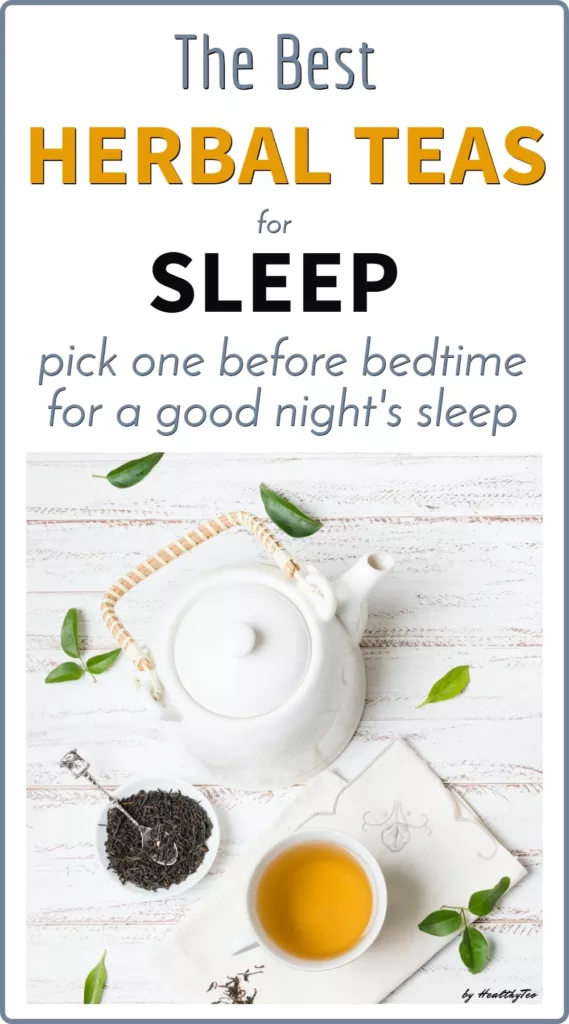The best herbal teas for sleep
Herbal teas have been used around the world for centuries as natural sleep remedies. They are made from an edible herb or plant and can be a great option both day and night. Here is our list of herbal teas for sleep:
- Valerian root tea
- Passionflower tea
- Chamomile tea
- Magnolia bark tea
- Lemongrass tea
- Lemon balm tea
About 30% of people suffer from insomnia, or the chronic inability to fall asleep and stay asleep. Modern research supports herbal tea’s ability to aid sleep.
In this article, we will present you with some of the best herbal teas that may help you fall asleep faster, how to make them, and the best way to use tea for sleeping.
It is up to you which tea you will try and choose to be your bedtime drink that will relax you and help you to have a good night’s sleep.
This post may contain affiliate links, which means we may receive a small commission, at no cost to you, if you make a purchase through a link. For more information, please see our disclosure.
Best herbal teas that help you sleep
Valerian root tea
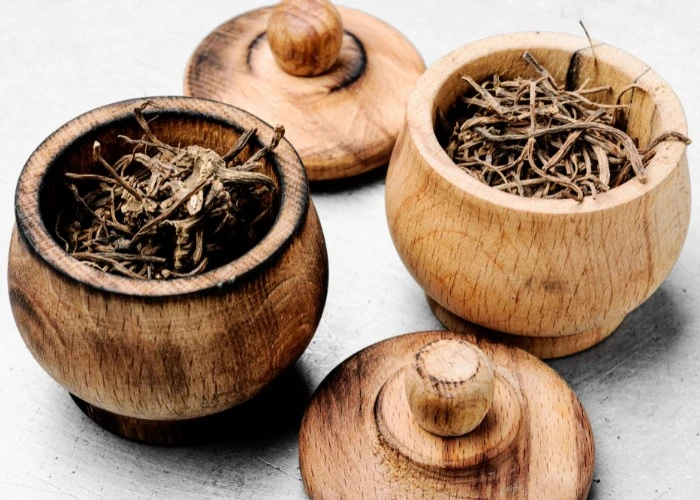
Valerian tea is an herbal beverage made from the roots and stems of the valerian plant. Brewing tea with valerian is the oldest known way that humans have benefited from the relaxing properties of this root.
Its use dates back to the 2nd century. Back then it was prescribed in traditional medicine to reduce anxiety and insomnia. Valerian is often called a magic sleep potion.
Today, not everyone consumes valerian in tea form. Some consumers buy the product in capsule form or pill.
Let’s see what science says about this herbal tea for sleep. Valerian root is effective as a sleep aid due to the two naturally occurring sedatives within called – valepotriates and sesquiterpenes.
In one study almost 90% of people reported improvements in sleep after drinking valerian tea.
Another clinical trial showed that people fell asleep faster after drinking a valerian extract and their sleep quality improved.
You must be aware that most of the studies are conducted with valerian extract or capsules which are more concentrated than valerian tea.
Despite the fact that more research is needed there is much evidence that supports the positive effects of valerian tea on sleep quality.
How to make valerian tea
Valerian tea is sold most often in the form of a teabag. You can also find a loose-leaf variety and you can order it here from Amazon this valerian root organic tea.
Here are the steps of preparing valerian tea for better sleep:
Place a tea infuser containing about one tablespoon of loose tea leaves in a teacup. Heat water to 194-205 F or 90-95 C. No tea, not even herbal tea should ever be made with boiling water. You get a very poor-tasting brew that way.
If you don’t have a temperature-controlled teapot bring water to a boil and then let sit for a minute. This allows reducing the temperature just slightly.
Pour 8 ounces (230 ml) of water over the infuser. Let tea leaves steep for as long as desired.
If you prefer lighter tea, 2-3 minutes is sufficient. A 3-5 minutes steep will brew a stronger cup of tea that provides more intense effects.
Remove the infuser from the cup before drinking.
Taste: Pure valerian root tea has an aroma and flavor that many people find unappealing. So for better taste, it is recommended to combine valerian tea with milk or honey to soften the flavor.
Some people add mint or chamomile but since those teas provide also calming effects you may want to be cautious about blending them.
Valerian tea for sleep – side effects
Due to its sedative properties, it is NOT good to combine this tea with alcoholic beverages or medications that promote muscle relaxation or sleep.
Furthermore, you should NOT DRINK valerian tea if you take medications for insomnia, anxiety, seizures, or other psychiatric disorder.
Potential side effects of valerian include vivid dreams, headache, stomach problems, fogginess, heart disturbances. It is recommended to talk to your doctor first before using valerian tea or other herbal treatment.
Young children and pregnant or breastfeeding women should avoid valerian root due to a lack of safety information.
Chamomile tea for better sleep
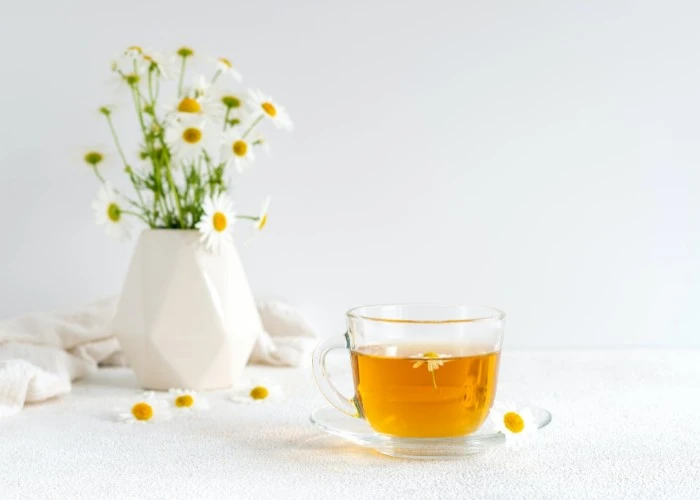
Chamomile tea is an herbal tea or tisane made using flower petals from the chamomile plant. This is the most well-known sleepy-time tea. It is always near the top of any bedtime list.
Many people enjoy chamomile tea as a caffeine-free alternative to black or green tea. Flowers of the chamomile plant have been used for many years to treat a variety of issues, including poor sleep.
According to science chamomile tea contains apigenin. This is an antioxidant that binds to certain receptors in your brain that may promote sleepiness and reduce insomnia.
A randomized controlled trial published in the Journal of Advanced Nursing evaluated the effects of chamomile tea on sleep quality and depression in postpartum women.
Results showed that postpartum women who drank chamomile tea for two weeks reported better sleep quality compared to a group that didn’t drink chamomile tea. Participants also had fewer symptoms of depression which is often linked with sleeping problems.
In another human study from 2011, scientists found that chamomile was useful in improving wakefulness and alertness after sleep. This indicates better sleep quality when patients consume chamomile tea.
More studies are necessary to determine the extent of chamomile’s tea effects on sleep. According to what scientists have found by now drinking chamomile tea before bed is certainly worth it if you have trouble falling asleep.
When should I drink chamomile tea for sleep?
The best time to drink a cup of chamomile tea for better sleep is about 30-45 minutes before bed. This will give your body enough time to metabolize the tea and the chemical compounds that cause those sedative effects to kick in.
Who should not drink chamomile tea?
Persons who take anticoagulant medications should not drink chamomile tea. Also, do not drink chamomile tea if you have a pollen allergy, especially to ragweed, chrysanthemums, and marigolds.
According to the National Center for Complementary and Integrative Health, if you are allergic to the pollen found in these plants you may have a similar reaction to the chamomile.
Little is known about whether it’s safe to use chamomile during pregnancy or while breastfeeding.
As always consult with your doctor first before taking this herbal tea if you have any allergies or taking medications.
Passionflower tea
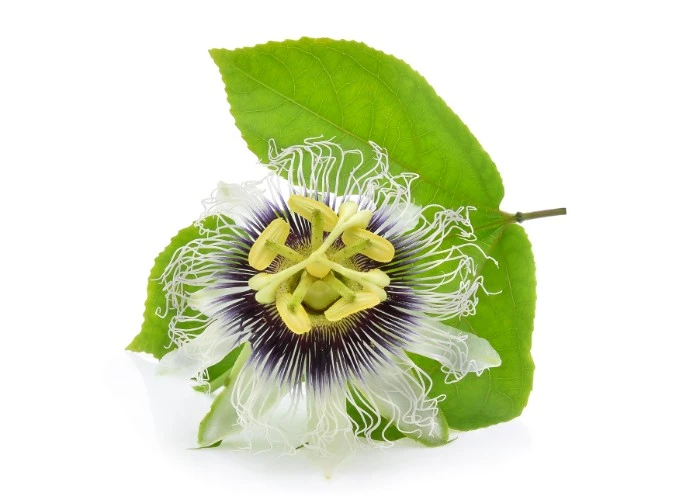
In this list of teas for better sleep passionflower tea must be mentioned. This tea is made from both fresh and dried leaves of the Passiflora incarnata plant. This herbal tea has long been used to treat sleep disorders, such as insomnia or restlessness at night.
One study from 2011 investigated the effects of passionflower herbal tea on subjective sleep quality.
With 40 healthy adults participated in this study, the results showed that those who drank passionflower tea daily for one week reported significantly better sleep quality, compared to participants who didn’t drink the tea.
Passionflower tea contains a flavone commonly found in honey that induces calm and soothes muscles to increase metal response.
Recipe for passionflower tea for better sleep
For a good night’s sleep try seeping a cup of passionflower tea right before bed. To make this tea you can use teabags or order this dried passionflower from Amazon.
Ingredients
- 1 tbsp. dried passionflower ( about 2 grams)
- 1 cup hot water
- honey or prefered sweetener, amount optional
Directions
Place 1 tbsp. dried passionflower in a cup. Pour 8 ounces of hot water over the dried herb. Cover the cup with a small plate or lid. Let it steep for 5-8 minutes. Steep for 10-15 minutes for a stronger tea.
When done steeping strain and remove any floating passion flowers. Optional: sweeten with a touch of honey or another sweetener.
Dosage: Drink one cup of passionflower tea made with 1 tbsp. of dried passionflower before night for at least seven days to feel the effects.
Lemon balm tea
Lemon balm is a lemon-scented herb that comes from the same family as mint. It is mostly sold in extract form for aromatherapy, but lemon balm leaves are also dried for tea.
Tea made from lemon balm leaves contains compounds that help to soothe stress and relax muscles.
According to a pilot trial, scientists believe that lemon balm triggers GABA receptors in the nervous system, which results in an increased state of rest and calm.
Studies also show that a combination of lemon balm and valerian can have mild to moderate effects on insomnia and sleep disturbance disorder.
According to a 2013 study lemon balm and valerian root combination significantly improved sleep quality in 100 women with menopause when compared to placebo.
If you are struggling with restlessness and anxiety a cup of lemon balm tea before bed is a good way to help you reduce stress before bedtime and may help you get a good night’s sleep.
Here is our suggestion of a tea for better sleep that is a combination of lemon balm and other herbs. This sleep tea is a combination of lemon balm, valerian, chamomile, and lavender.
Possible side effects of lemon balm tea
Lemon balm tea is generally safe for consumption when consumed in moderate quantities. Individuals who are sensitive to plants in the mint family should avoid this tea.
You should NOT drink lemon balm tea if you are taking diabetes medications, thyroid medications, or have a thyroid problem.
Research hasn’t shown any negative side effects to date in terms of pregnancy, but it is best NOT to consume it during pregnancy or breastfeeding as studies are still ongoing.
Magnolia bark
Magnolia bark is a traditional Chinese herb. The magnolia plant has an ancient history as a therapeutic compound in traditional Chinese, Japanese, and Korean medicine.
Typically, magnolia bark is the bark of the houpo magnolia tree that has been stripped away from its branches and stems to make supplements. Magnolia bark extract is found in supplements, tea, toothpaste, topical oils, and cream.
The bark is rich in two neolignans – magnolol and honokiol. According to 2012 research, its primary compound honokiol has been shown to reduce the time it takes to fall asleep by binding to GABA receptors which help prompt sleep.
This research also shows that at least one bioactive compound in magnolia bark can increase the amount of time you spend in both REM and NREM sleep, and reduce the time it takes you to fall asleep.
The easiest way to use this herbal tea for better sleep is to make it by using tea bags. You can order magnolia bark tea ( 25 tea bags) from Amazon here.
For better sleep drink a cup 30-60 minutes before bed.
Who should not drink magnolia bark tea?
Women who are pregnant or breastfeeding should NOT drink magnolia bark tea. Furthermore, it can interact with alcohol.
The combination of magnolia and alcohol may cause excessive sleepiness. Individuals who take anticoagulant or sedative medications should NOT drink magnolia bark tea too.
Lemongrass tea
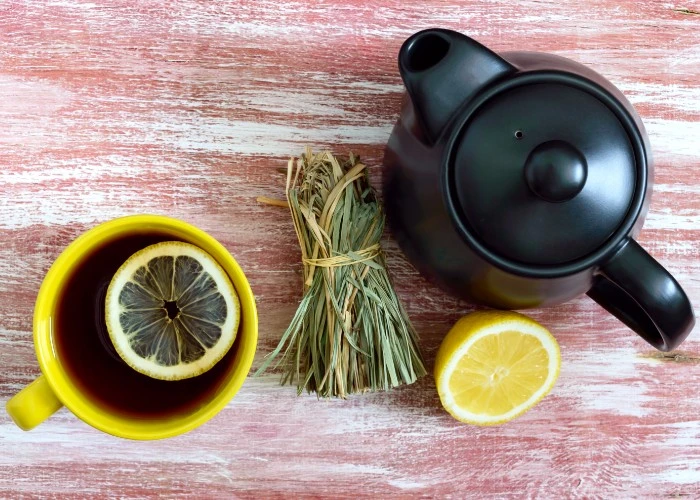
Lemongrass tea also takes a major place in the list of herbal teas for better sleep. Stems from lemongrass can be chopped into small pieces and then brewed into a powerful tea that poses a wide range of nutrients, organic compounds, and antioxidants that impact the body.
Scientists believe that lemongrass tea triggers the release of serotonin. This hormone has been connected to improving happiness and mood.
Also, the natural chemicals in lemongrass tea are sedative in nature. This may help relax the mind and prevent worry and stress from building up.
Fresh lemongrass tea recipe
Step 1: If you use fresh lemongrass first thing you need to do is to rinse your lemongrass to get rid of impurities but be careful to not cut yourself because lemongrass blades are sharp.
After rinsing cut your lemongrass into small pieces.
Step 2: Keep a pot with water to cook on the stove and add in your lemongrass leaves.
Step 3: Simmer your tea in the pot covered for about 10 minutes. Keep away from the heat and allow the tea leaves to get infused for a few more minutes.
Strain tea from leaves. Add sugar and stir well. Serve in your favorite teacup and garnish with a lemon slice.
You should NOT drink lemongrass tea if you are pregnant, take prescription diuretics, have a low heart rate, or have low potassium levels.
If you are considering adding lemongrass tea to your weekly or daily regimen, it is always a good idea to speak with your doctor first if you have any medical issues to avoid complications.
How to know that you are buying quality tea that may help you sleep better?
Good quality tea is often easily recognizable by the shape of the leaves, flower buds, or herbs. Lower quality tea is often powdered or crumbles.
In a good quality herbal tea, you should be able to see pieces of plants or flowers in the tea. Dried flowers and herbs should have some weight and color on them along with a fragrance, not unlike the fresh plant.
On the other hand, old and low-quality herbs would feel lightweight, and they probably won’t have as much fragrance or taste.
Best way to use tea for sleeping
These herbal teas for sleep will certainly help you to fall asleep a little faster. But be aware that too much tea before bed will have the opposite effect.
Be aware that if you don’t want to get up from bed in the middle of the night for the call of nature, it is best to finish your bedtime tea at least 45 minutes to an hour before going to bed.
Aim to brew and drink your favorite tea for sleep at least 60 minutes before bed, or try to drink it at least with enough time to hit the bathroom before bed to keep your sleep uninterrupted.
Final thoughts about the best herbal teas for sleep
Our list of herbal teas for sleep is consist of:
- Valerian root tea
- Chammomile tea
- Passionflower tea
- Lemon balm tea
- Magnolia bark tea
- Lemongrass tea
These herbal teas that we’ve recommended here will certainly help you to fall asleep faster and have a good night’s sleep.
No matter what tea you will choose one thing is for sure the warmth and fragrance of a cup of tea before bed can help you achieve a sense of calm.
Many of these teas have calming effects that keep them popular among people who have trouble sleeping.
Remember that the best time to drink your cup of tea for better sleep is about 60 minutes before going to bed.
If you have any allergies or taking any medication consult with your health care provider before choosing one of these herbal teas for sleep!
